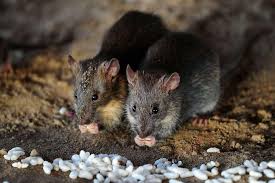Rats are more than just unwelcome guests; they are destructive pests capable of causing significant damage to homes and businesses in Greenwich. Whether it's the contamination of food, the spread of dangerous diseases, or damage to property, a rat infestation is a serious issue. In this article, we will explore the common problems created by rats, how they enter homes, and the most effective methods for rat control in Greenwich.
Understanding the Rat Problem in Greenwich
Greenwich, with its lush greenery, parks, and historic buildings, provides an ideal environment for rats to thrive. The abundance of food sources and shelter in urban and suburban areas make homes and businesses vulnerable to rat infestations. Common species found in the area include the Norway rat and the roof rat, each with its own habits and challenges.
1. Health Hazards:
One of the biggest concerns with rat infestations is the threat to human health. Rats carry a variety of diseases, some of which can be transmitted to humans directly or indirectly. Common diseases associated with rats include:
- Leptospirosis: This bacterial infection can cause symptoms ranging from mild headaches to severe organ damage. It is often contracted through contact with water contaminated by rat urine.
- Hantavirus: Spread through rat droppings, urine, and saliva, this virus can cause respiratory illnesses.
- Salmonella: Rats can contaminate food and surfaces, leading to food poisoning if ingested.
These health hazards underscore the importance of swift and effective rat control in Greenwich homes and businesses.
2. Property Damage:
Rats have strong, continuously growing teeth, which they use to gnaw on almost anything they come across. This gnawing habit can lead to severe damage, including:
- Chewed electrical wires: This can increase the risk of fires.
- Damaged insulation: Rats nest in insulation, reducing its effectiveness and leading to higher energy bills.
- Destroyed structural components: Rats will gnaw on wood, drywall, and other building materials, potentially compromising the structure of your home.
Moreover, rats can burrow and dig tunnels around foundations, which can weaken the structural integrity of a building over time.
3. Contaminated Food and Water:
Rats are notorious for contaminating food sources. They are skilled climbers and can access pantries, kitchens, and food storage areas with ease. The result is contaminated food that is unsafe to consume. Additionally, their droppings and urine can taint surfaces, posing a risk to anyone preparing food in the area.
How Do Rats Enter Homes in Greenwich?
Understanding how rats gain access to your home is crucial for effective rat control. Rats are opportunistic, and they will exploit any weakness in your home’s defenses to gain entry.
- Cracks and holes in walls: Rats can squeeze through gaps as small as a half-inch wide. They often enter through cracks in walls, foundations, or gaps around utility pipes.
- Open doors and windows: Rats are excellent climbers and can scale walls to access open windows or doors, especially in poorly maintained or older properties.
- Roof access points: Roof rats, as their name suggests, often enter homes through openings in the roof, vents, or eaves.
- Basements and crawl spaces: Dark, moist, and rarely disturbed areas like basements and crawl spaces provide the perfect nesting environment for rats.
Effective Rat Control Methods in Greenwich:
If you suspect a rat infestation, prompt action is essential. There are several methods available for rat control, ranging from preventative measures to professional extermination services.
1. Sealing Entry Points:
The first step in rat control is to eliminate access points. Conduct a thorough inspection of your home or business and seal any cracks, holes, or gaps in the structure. Pay close attention to areas around doors, windows, pipes, and vents. Using steel wool or metal mesh to block these points can be an effective solution, as rats cannot chew through metal.
2. Eliminate Food and Water Sources:
Rats are attracted to food and water, so reducing these attractants is critical. Store food in sealed containers, clean up crumbs and spills immediately, and ensure that garbage bins are properly closed. Additionally, fix any leaks in plumbing to prevent water sources that rats can use.
3. Traps and Baiting:
Trapping is a common method of rat control. Snap traps, glue boards, and electronic traps can be strategically placed in areas where rat activity has been detected. Traps should be placed near walls, along rat pathways, and in dark corners.
Baiting with poison is another option, but it must be used with caution. Poison can be harmful to pets, children, and wildlife, so it’s best used under professional supervision. Always follow local regulations regarding the use of rodenticides.
4. Professional Pest Control Services:
For larger or more persistent infestations, professional rat control services are often the most effective solution. Pest control experts have the knowledge and tools to safely and efficiently eliminate rats from your property. They can provide ongoing monitoring and maintenance to ensure that rats do not return.
In Greenwich, professional pest control companies can tailor their services to the unique challenges of the area, using eco-friendly methods that are safe for your home and the environment. They may also provide advice on long-term prevention measures.
The Importance of Regular Inspections:
Even after successfully eliminating a rat infestation, it's important to remain vigilant. Regular inspections of your home, especially in vulnerable areas like basements, attics, and kitchens, can help you spot the early signs of a rat problem before it becomes a full-blown infestation.
Look for common signs of rats, such as:
- Droppings
- Gnaw marks on furniture, wires, or walls
- Grease marks along walls (from rats' fur)
- Scratching noises, especially at night
- Nests made of shredded paper, fabric, or insulation
Conclusion:
Rat control in Greenwich is an ongoing challenge, but by understanding the risks and taking preventative action, you can protect your home and health. From sealing entry points to enlisting professional help, there are many ways to safeguard your property against these unwelcome invaders.

Comments
Post a Comment